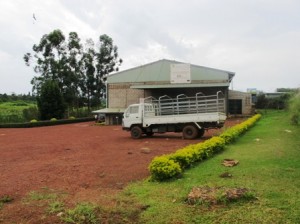Kiplagat says while farmers have joined into groups to raise the required quantities, it is difficult to ensure all farmers collect their produce carefully to meet the quality standard of WFP. “Many farmers are used to drying their produce on the soil, rocks or sides of the tamarc road. We find that farmers who are not sure they can meet the condition of at least collecting their produce on tapelines for proper storage before it is transported to the warehouse, opt out of the farmers groups,” Kiplagat says.
Farmers are also required to collect their food produce and take it to the group’s temporally store, which is difficult for most farmers with no means or money in villages where poor roads compound the transport problem. Moreover, a farmer must own or hire a maize shelling machine to be able to remove the maize produce from the cobs before transporting the produce to the store.
Long Distances to wares houses where WFP buys from
Simuntu Farmers Group managed to procure a truck which collects maize from the group members, keeps it at their store in Mbulamuti, before taking it in bulk to the Agro Ways Warehouse in Jinja which is licensed by UCE to clean, process and keep farmers’ produce as farmers await to sell to the best buyer. The warehouse is 40 kilometers from Kamuli. According to Rwego, there are only four operational warehouses (in Jinja, Masindi, Mbarara and Kasese), although he says another 10 will be opened up in 2010.
For now, even Kiplagat’s group and other farmers in Kapchorwa are expected to bring their produce more than 100 kilometers to the Agro Ways warehouse in Jinja. Since it is the only warehouse in eastern Uganda and farmers harvest at the same time, farmers are forced to wait for hours or days to get their food produce dried and bagged, before they are given a warehouse receipt. Such a situation is discouraging for farmers who are used to having their food produce bought from their homes.
But more than the waiting is the issue of costs to dry and store the produce. Kakuba says each farmer has to pay 40 shillings per kilogram for drying at the warehouse. It is this payment that many farmers interviewed see as a key challenge in benefiting from Purchase for Progress project. “The fee at the warehouse has to be paid immediately, but many farmers look to only their farm produce for money. To be told to spend more money on your produce before you sell is a challenge to many farmers,” Kakuba says.
After all this process, some farmers say they find that WFP is offering them a price lower than the current market price. “Last season for example (early 2009), traders from Sudan were offering 900 shillings per kilo yet WFP was buying at 740 shillings. Moreover, the traders from Sudan were buying the maize as it is and you don’t need to fulfill all those conditionalities of quality by WFP,” says Rogers Nsubuga of Unity Cereal farmers based in Masaka.
“When you look at the inputs that are required to produce what WFP needs, as compared to the price WFP is giving, sometimes you find a discrepancy that constrains the farmers,” says another farmer Charles Bamwite of Kamuli. Some farmers interviewed said they lack the money to buy improved seeds, fertilizers and the land that would enable them generate substantial food produce.
Nsubuga says that many farmers don’t have big parcels of land required to produce the big amounts that WFP wants farmers to supply. “In our place, small farmers do not own land. They operate on small parcels on land owned by landlords, and since land is limited, it is expensive to buy land from landlords,” Nsubuga says.
Certain contracts, timely pay important to farmers
Also, the fact that WFP does not buy any produce until it is in the warehouse, and no farmer is sure of being selected makes many farmers desist from supplying to WFP. Many of the farmers interviewed expressed need for WFP to give them forward contracts- so that they are sure the food they are growing will be bought by WFP. Right now, WFP gives tenders to farmers who have their food in the warehouse, but these farmers have to bid among themselves (groups) to offer the lowest price for the best quality.
“We pray that WFP can give us contracts on planting so we are more sure as we invest in farming. WFP can pay when they take our produce, but we as farmers want to grow when we are sure,” Kakuba says.
Lydia Wamala, WFP Spokesperson in Uganda says “in the coming few months” WFP will introduce forward contracting for small holder farmer groups as a means to guarantee them a market.
“Farmers will be able to enter into a contract with WFP before, during planting or at post-harvest time. We hope that this approach will encourage farmers to grow more food and also access agricultural credit from financial institutions, with whom we are in discussion with in this regard. Financial institutions in Uganda are getting more interested now than never before, to extend agricultural credit to farmers, on condition that there is a guaranteed market for the product. WFP being one of the largest buyers of grain in this country, provides this confidence,” Wamala says.
WFP payment procedures were also mentioned by many farmers interviewed as another disincentive for farmers to grow more food crops to sell to the UN agency. See more on next page 4



Pingback: Multimedia news information advertising Services in Uganda East Africa | Reliable Media Consult (U) Ltd
Pingback: World Food Program to buy maize from Gulu farmers | Uganda Multimedia News & Information